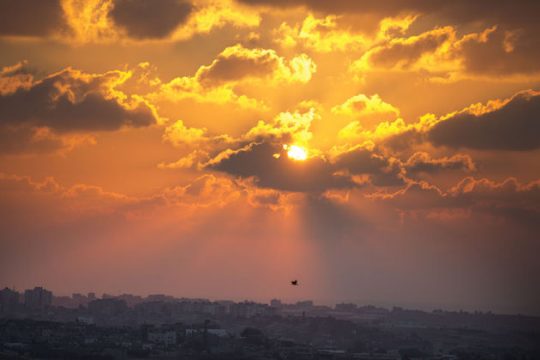Since March, Israel and Hamas have been in a war of attrition that neither wants to escalate into a full-blown confrontation. Ironically, that is exactly where things are leading. Netanyahu just announced the cancellation of his visit to Colombia due to tension in the south.
Incendiary kites and balloons not only light up thousands of acres of Israeli crops and forests, but also Israeli television screens. During the periodic rocket barrage, the last one two weeks ago, Israelis are also treated to the sight of families huddling in bomb shelters.
This week marked a shift in tone from southern residents who so far have shown remarkable patience. Their regional representatives took to the airwaves to say that the Army must do more. Adding an exclamation point to their anger was news that a balloon bomb made it as far as the city of Beersheva—a distance of 30 miles, raising fears about just how far these aerial attacks can go. (The balloons were filled with helium, which Israel allowed into the Gaza Strip for medical purposes.)
Their frustration is fueled by the unfulfilled threats of Israeli government leaders. Justice Minister Ayelet Shaked said on a July 3 tour of the area: "A kite at the Gaza envelope should be treated like a rocket on Ashkelon." On July 14, Education Minister Naftali Bennett said, "Restraint creates escalation ... The IDF must be ordered to act with force, sophistication, and thoroughness." On July 20, Defense Minister Avigdor Lieberman, speaking in the southern town of Sderot, repeated warnings he had made months earlier: "If they continue pushing us to a wide-scale operation, then we will have a large-scale operation, on a wider scale and more debilitating than Operation Protective Edge," referring to the 2014 IDF action that earned the south three and a half years of relative quiet.
On Thursday, for the second time Lieberman ordered the Kerem-Shalom border crossing closed to gas shipments. In May, he had ordered the crossing closed for an "indefinite" period only to reopen it six weeks later. To close it and open it and close it again so quickly re-enforces the feeling of Israelis that the government's response has been tepid.
Indeed, more rockets and mortars have been fired on Israel this year (289) than were fired in the period preceding Operation Protective Edge (205) in 2014. What's different this time is that Netanyahu is fixated on the north and ridding Syria of its Iranian presence. Reportedly, he also argues it's better to wait for the completion of a massive $833 million tunnel barrier currently under 24-hour construction before taking action in the south.
Hamas is no more eager for an Israeli incursion than Israelis. It knows that's a fight it can't win. Nevertheless, it has upped the ante, changing its policy from "restraint" to "controlled violence," including low-level terrorism, such as fire kites and demonstrations at the security fence. The reasons for the policy change are varied. According to the Meir Amit Intelligence and Terrorism Information Center, Hamas had wanted calm to rebuild its military infrastructure, much of its focus being on its tunnel system into Israel. But with Israel's improved anti-tunnel technologies, Hamas lost some of its motivation for waiting. Second, Hamas wanted time to patch up relations with Fatah and the PA—efforts that have failed. Third, Hamas needed to find an outlet for Gazans' anger over their tanking economy. Lastly, Hamas hopes violence will lead to a massive influx of international aid.
However, Hamas doesn't seem willing or capable of "controlling" the confrontation. On July 20, a Hamas terrorist killed an Israeli soldier. Less than a week later another soldier was wounded in the same area. The IDF said it doesn't believe this was done with the approval of Hamas's leadership. Nevertheless, Hamas does not want to back down lest it appear weak.
The result is predictable: Escalation followed sooner or later by military confrontation.
